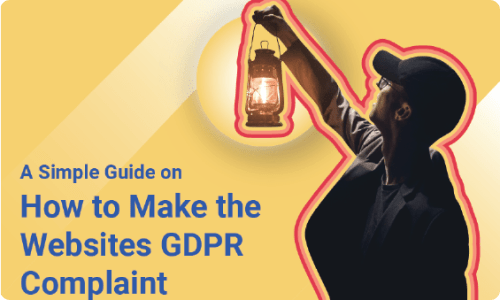For most of us, our websites are a general platform for sales. As such, since we’re often handling personal data for our customers, they need to be GDPR compliant; that is to say, they need to use specific data protection measures to operate legally in the European Union.
It’s required by law for every company to document its customer relationships, retain data for two years, and make it easy for people to opt-out of having their data passed on to third parties. As a small business, it’s often difficult to know where you stand with this; still, you should always be aware of which policies and guidelines you need to adhere to in order to keep your website on the right side of the law, and this post will help with that.
- The changes to data protection regulations require everyone, including businesses, to control their data. To meet this requirement, personal data may not be collected from customers unless customers have given explicit consent. So, for example, if a company wanted to create a database that included the name, address, e-mail address, and telephone number of every one of their UK customers, they would need to get permission from each person involved. This change includes a definition of “consent,” often interpreted to mean that customers have the right to understand what data companies are storing about them.
- When a customer agrees to save their data on your website, it must be stored in a way that is identifiable. This step allows you to contact them if there are any disputes about their data. If you are using an online service for customer support, the best way to handle this is by telling the customer how their data will be used so that they understand how the privacy settings apply and that there are protective measures in place.
- As internet usage increases and digital life becomes more reliant on data, there is an increased demand for better information protection. This is why guidance and best practice around data security is so important; it helps businesses and individuals understand how they can remain protected. The GDPR requires all organisations to protect data in a way that is consistent with the right of access and gives people the chance to know what their privacy rights are. These must be effectively communicated to every user of the organisation’s services or enterprise network, and they should always be regularly updated.
- Data breaches are a natural part of life in the Information Age. As such, it is no surprise that organisations are increasingly focused on ensuring that their cybersecurity and education programs are continually revamped to ensure that data flowing through them is as secure as possible. Nevertheless, there’s only so much your business can do, and so it’s vital to have a data breach policy in place. This policy should contain all of the essential information about your business’s approach to data, such as the steps you have taken to protect against data loss, how any breaches will be reported to the Personal Data Protection Commission (data protection authority), how the public can access their own information, and what will happen in the event of a data breach affecting an individual.
There are three main kinds of breaches: data that has been accidentally passed across internal networks, data that has been stolen by hackers and misused, and data that has been leaked by an employee but has been inadvertently left unsecured on the company’s systems. All three can have very serious consequences for your business, should an unscrupulous outside source discover them.
- One of the key aims of GDPR is to enable anyone to request access to the personal information held by any business. For example, customers may ask for copies of invoices, contract documents, or financial data held by the business. The regulation also sets out the process for obtaining such information and clarifies how the law will be implemented. Information should be available if customers ask for it, and unless there are exceptional circumstances, the data must be made available within 14 days of the request.
- Whenever you create or update a data record on a website, there is a chance that information could be lost or altered forever. This is known as the “right to be forgotten.” With GDPR, that right is even greater because it applies to all services and commercial activities, including your digital activities on social media and other online platforms. In addition, users have the right to have their personal information removed from databases that hold information on third-party websites if they have given prior informed consent or if the data is inaccurate, obsolete, or in breach of data protection laws.
- Businesses and organisations that have received or are expected to receive any personal data from customers should consider the following for GDPR Website Compliance in the UK. Personal data is any information that could be used to identify or contact you, your customer, or someone who has contracted with you: in effect, any stakeholder in your business. This includes identifiable data about your customers, their purchases, contacts with you, activities within your business, or data that could be used to recognize someone who has contracted for you.
Conclusion
When designing a privacy policy for a website, it is important to consider what data is being collected and why. This is specifically true when dealing with third-party services that might have their own privacy policies. For example, if you are using services such as Google Analytics, be aware that they may collect IP addresses. In addition, if you wish to enable cookies from these services, it is necessary to state this in your privacy policy and provide instructions on how this can be enabled.
Many people fail to understand why it’s so essential to have these policies in place (or the potential consequences of not having them). By law, website operators in the UK must track and report the demographics of their visitors and any personally identifiable information (PII) within a certain time frame. In other words, if you run a social media site where you host members-only forums and allow free access to your e-mail service through third-party software, you must observe GDPR and provide your visitors with clear, concise notices about how you use their data.
For further information regarding this blog, please don’t be afraid to e-mail us at info@engagebranding.com.



